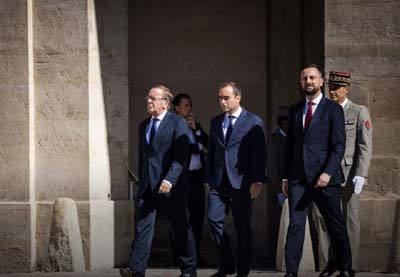
France deepens military ties with Germany, Poland
Paris: France, Germany and Poland agreed this week to deepen defense cooperation ahead of a snap election that could see the far-right National Rally enter the French government.
French Armed Forces Minister Sébastien Lecornu shared the stage with his German and Polish counterparts, Boris Pistorius and Wladyslaw Kosiniak-Kamysz, to make the announcements on joint exercises, military mobility and industrial cooperation.
Hanging over the meeting was the political storm unleashed by President Emmanuel Macron earlier this month. He unexpectedly dissolved parliament after his liberal party took a drubbing at the hands of the far-right in the European election. That could cost Lecornu his job.
“On a totally selfish personal note, I’d be delighted to be able to continue the good cooperation we’ve established with Sébastien Lecornu, there’s a lot to do. Defense policy has never been so important,” Pistorius told reporters when asked whether he was worried about the impact of a National Rally victory in the two-round election on June 30 and July 7.
The decision of French voters “will have an impact throughout Europe,” added Kosiniak-Kamysz. He underlined the need for continued support to Ukraine — a key policy for Warsaw but one thrown into doubt by the past pro-Moscow lean of the National Rally.
Monday’s gathering was the first gathering of the three countries’ defense ministers since 2015, showing the revival of the so-called Weimar Triangle format after it went into a deep-freeze during the eight years that Poland’s nationalist Law and Justice (PiS) party was in power.
PiS was suspicious of Germany, and angered France by tearing up defense contracts. The fear is that a nationalist government in Paris could create similar problems for multilateral cooperation with European allies.
“Political formations will be sending out a message: either one of withdrawal, weakening France’s position in the world … or a message of clarity,” Lecornu said.
Lecornu announced that France will join a so-called military Schengen agreement already signed by Poland, Germany and the Netherlands. Belgium and Luxembourg are observer members. The deal aims to ease the movement of troops and military equipment throughout the bloc.
“There’s no effective defense without effective mobility. Bureaucracy cannot stand in the way of our operational activities,” said Kosiniak-Kamysz.
The Polish defense minister added that France, Germany and Poland will conduct joint military exercises in Poland next year.
On the margins of July’s NATO summit in Washington, France, Germany and other interested countries will sign a letter of intent on jointly developing deep-strike capabilities, Lecornu said. “France already has technological building blocks with its naval cruise missile. Let’s see how we can work together,” he said.
Both Pistorius and Lecornu insisted that their joint projects for the next-generation battle tank (the Main Ground Combat System) and next-generation fighter jet (the Future Combat Air System) were open to other European partners.
Asked whether Warsaw was planning to join, Kosiniak-Kamysz dodged the question. Poland buys most of its arms from the U.S. and South Korea, angering some European allies.
Lecornu said France would continue to provide Ukraine with Aster and SCALP missiles, as well as Modular Air-to-Ground Armament. Paris will also send Mirage 2000-5 fighter jets that will help Ukraine gain air superiority, he added.
But Jordan Bardella, National Rally’s prime ministerial candidate, made clear he wouldn’t send long-range missiles to Kyiv. A National Rally victory could cause a crisis in foreign and defense policy.
Traditionally, those are among the areas where the French president is in charge, but Lecornu admitted that it’s up to the government of the day to carry out the president’s policies. For example, weapons transfers are “ordered by the president of the republic, but signed by the minister of the armed forces.”
He denied there was a rush to cement aid to Ukraine in case of a changer of power next month. “The agenda of the armed forces ministry is not connected to an electoral agenda.”
Whatever the results, he added, Macron will represent France at next month’s NATO summit.
